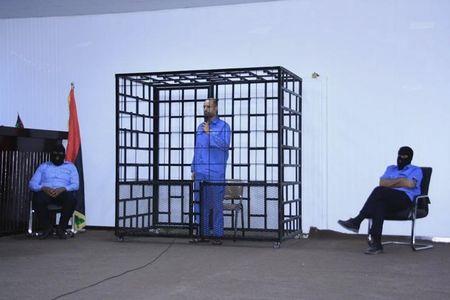Advertisement
Libya court to rule on Gaddafi's son Saif, former officials on July 28
TRIPOLI (Reuters) - A Libyan court will rule on July 28 on a son of Muammar Gaddafi and 36 other former regime officials accused of war crimes and suppressing peaceful protests during the 2011 revolution, a state prosecutor said on Monday.
Saif al-Islam, the most high-profile of Gaddafi's seven sons, has been on trial together with former spy chief Abdullah al-Senussi. Any verdict on Saif would be in absentia since he has been held since 2011 by a former rebel group in Zintan that opposes the Tripoli government.
Others in the dock include Gaddafi-era prime minister Baghdadi al-Mahmoudi, former foreign minister Abdul Ati al-Obeidi and ex-intelligence chief Buzeid Dorda. They also face corruption and other charges.
The trial had started in April 2014 before fighting between rival factions in Tripoli ripped Libya apart in a power struggle which has produced two governments competing for authority.
It takes place in Tripoli which is controlled by a rival government set up after an armed faction called Libya Dawn seized the capital in August, expelling the official premier to the east.
The struggle has worsened chaos in the oil producer which has struggled to establish basic institutions since Gaddafi's four-decade one-man rule ended in 2011.
"The court has ended the hearing after all defendants gave their oral and written defense statements," said Sadiq al-Sur, head of the investigation department at the attorney general.
"God willing there will be a verdict on July 28...for 37 defendants," he told Reuters.
The International Criminal Court and other human rights organizations worry about the fairness of Libya's justice system although the North African country won the right in 2013 to try Gaddafi's former spy chief at home instead of at the ICC in The Hague.
Sur said all defendants had had plenty of time to meet their lawyers despite claims by some they had struggled to get access to their clients.
The verdicts could be appealed, said Sur.
Saif had appeared by video link in sessions at the start of trial but not later on. The Zintanis have refused to hand him over, saying they do not trust Tripoli to ensure he won't escape, but had agreed before the trial to have him tried in a court there.
(Reporting by Ahmed Elumami and Ulf Laessing; editing by Ralph Boulton)



















Add new comment